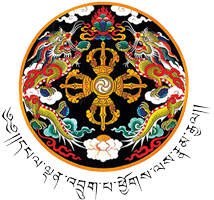
Bhutan Scouts Association
Mission
To contribute to the education of young people, through a value-based system based on the Scout Promise and Law, to help build a better world where people are self-fulfilled individuals, and play a constructive role in society.
Vision
Bhutan Scouts Association, by 2030, will be a leading youth organization that aligns with the national priorities and global goals to create patriotic, responsible and competent citizens contributing to achieving the Gross National Happiness aspiration.
Organogram
Training
coming soon
Strategic Priority Areas
- Youth Program
- Adult in Scouting
- Resource Management
- Communication and Partnership
- Good Governance
SCOUTING IN BHUTAN: A Journey of Growth and Transformation.
Scouting in Bhutan began in the 1970s, but it took a more structured approach in 1996 following a Royal Command from His Majesty The Fourth King. His Majesty emphasized the need for a systematic and comprehensive strategy to address youth-related issues. In response, the Youth Guidance and Counselling Division, under the Department of Education, introduced the School-Based Scouting Program to promote value-based education among students.
A significant milestone was achieved on 26th July 1999, when the Bhutan Scouts Association (Druk Scout Tshogpa) became a full-fledged member of the World Organization of the Scout Movement (WOSM) during the 35th World Scout Conference in Durban, South Africa. Since then, under the patronage of His Majesty King Jigme Khesar Namgyel Wangchuck, Scouting in Bhutan has evolved into one of the country’s most impactful youth development programs.
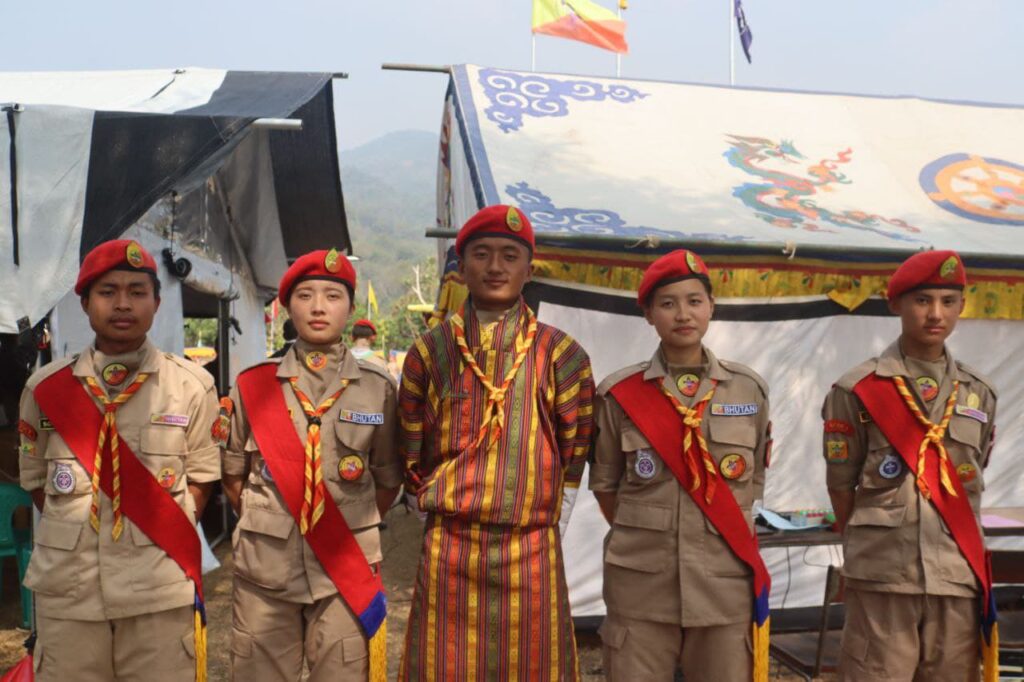
Currently, Scouting covers 92% of the student population, with five levels tailored to different age groups:
- Cheychey Scout: Pre-primary to Grade III
- Nachung Scout: Grades IV to VI
- Nazhoen Scout: Grades VII to XII
- Rovers: Colleges and Vocational Training Institutions
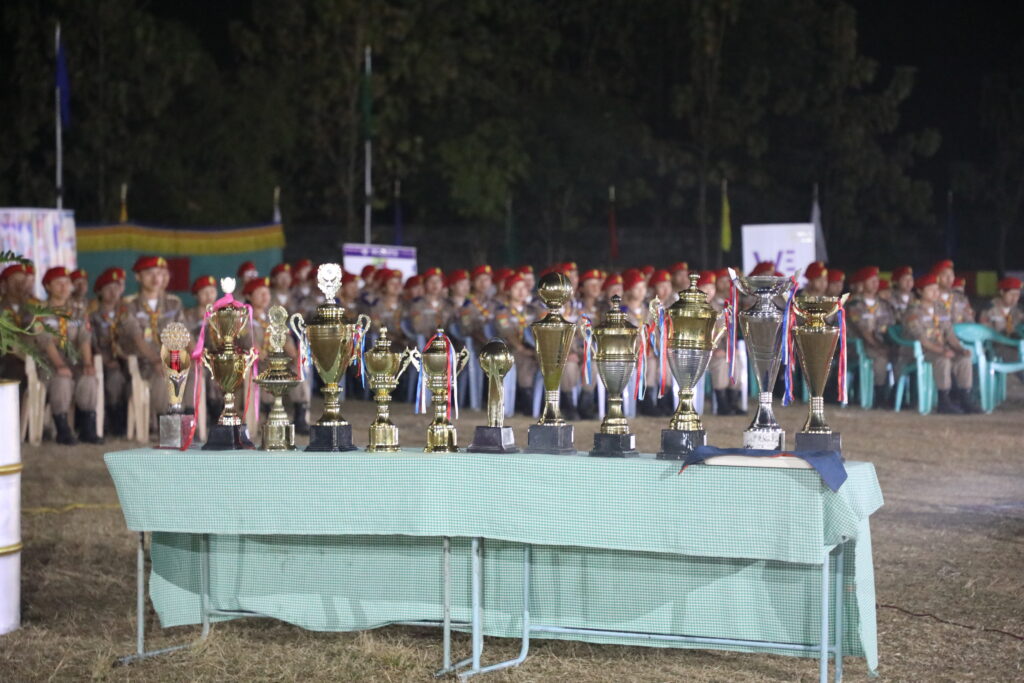
GROWTH AND KEY MILESTONES
Scouting in Bhutan has witnessed tremendous growth, with membership increasing from approximately 54,900 in 2018 to 140,123 in 2024. This expansion was driven by the Whole School Scouting Approach initiative, which integrated Scouting into school programs. The program gained momentum following a Royal Command in 2013, reaffirming its critical role in nurturing youth.
Key initiatives include:
- Leadership Training for outstanding Scouts
- University scholarships for exceptional Scouts
- Scout Mobile Camps
- Spiritual Retreat Camps
In recognition of this remarkable progress, the Bhutan Scouts Association was honored with the Highest Current Market Share Growth Award at the 43rd World Scout Conference in Egypt, August 2024.
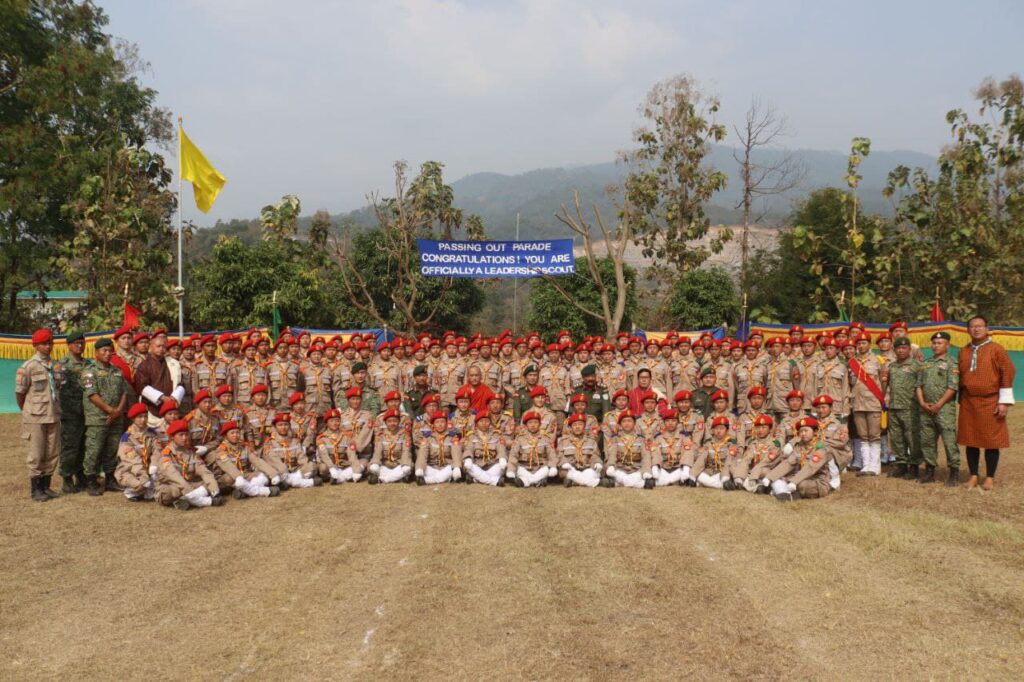
SCOUTING AS A CORE CO-CURRICULAR ACTIVITY
The Ministry of Education and Skills Development (MoESD) has positioned Scouting as a core co-curricular activity in schools. This decision aims to address pressing psychosocial issues such as mental health challenges, bullying, and substance abuse.
Challenges Facing the Scouting Program
Despite its impressive growth, the program faces several challenges, including:
- A limited number of trained Scout Adult Leaders
- Increased teacher workloads, reducing time for extracurricular activities
Insufficient dedicated time allocation, affecting program quality and depth
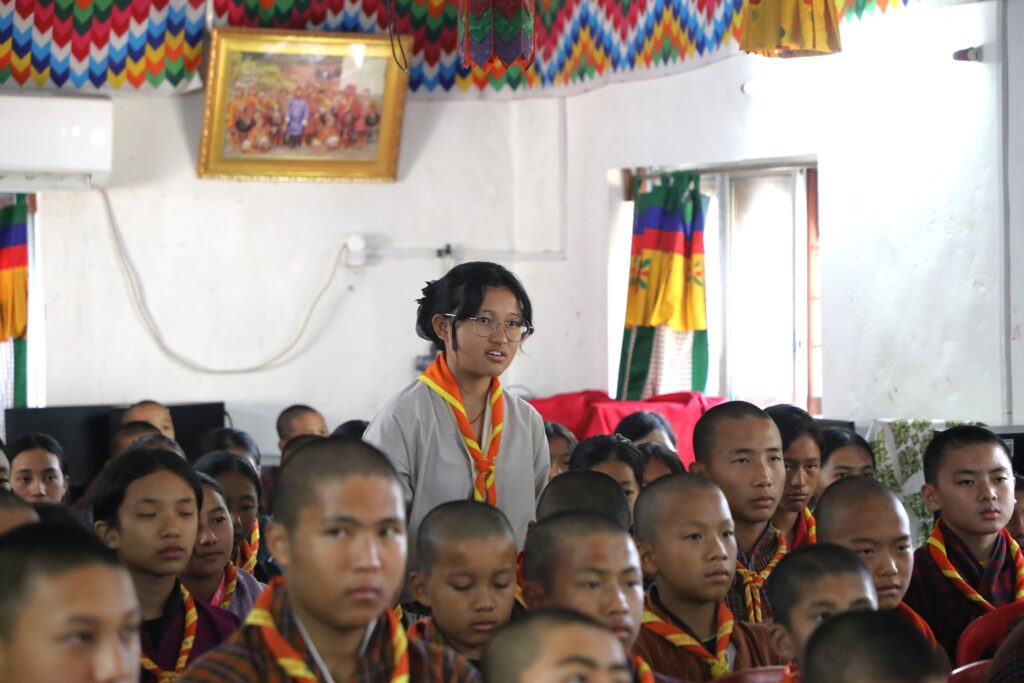
ADDRESSING CHALLENGES & STRENGTHENING THE PROGRAM
To tackle these challenges, the Scout and Sports Division, under the Department of School Education Programme (MoESD), has introduced several measures:
- Integration of Scouting as a core co-curricular activity within schools.
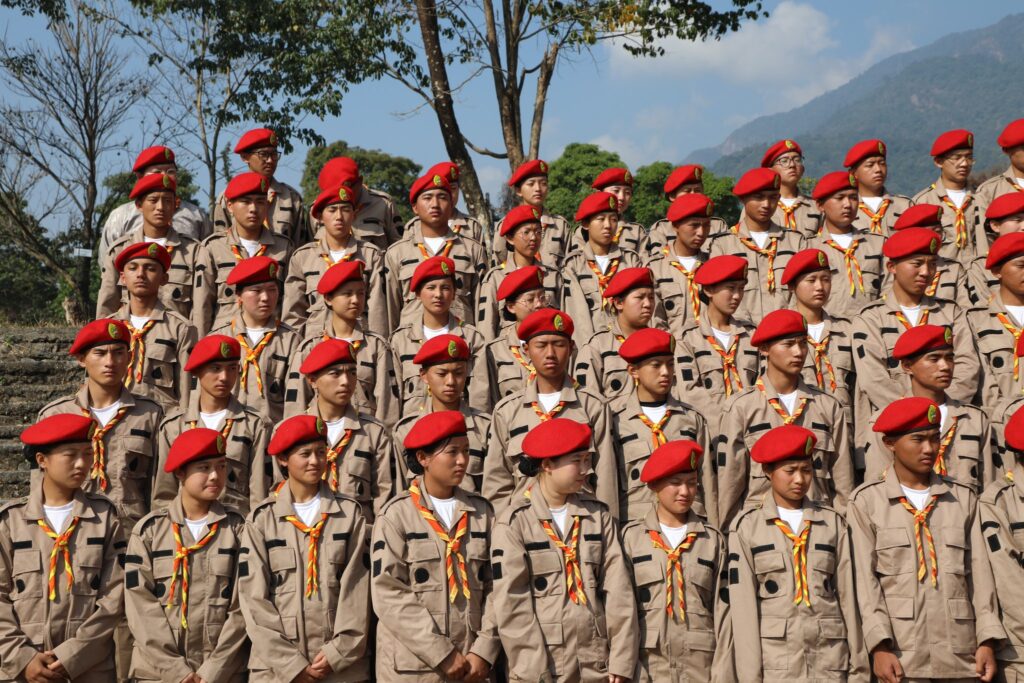
Nachung Leadership Training
- Regional Nachung Scout Camps
- Mobile Camps
- International Exchange Programs with the global Scouting community
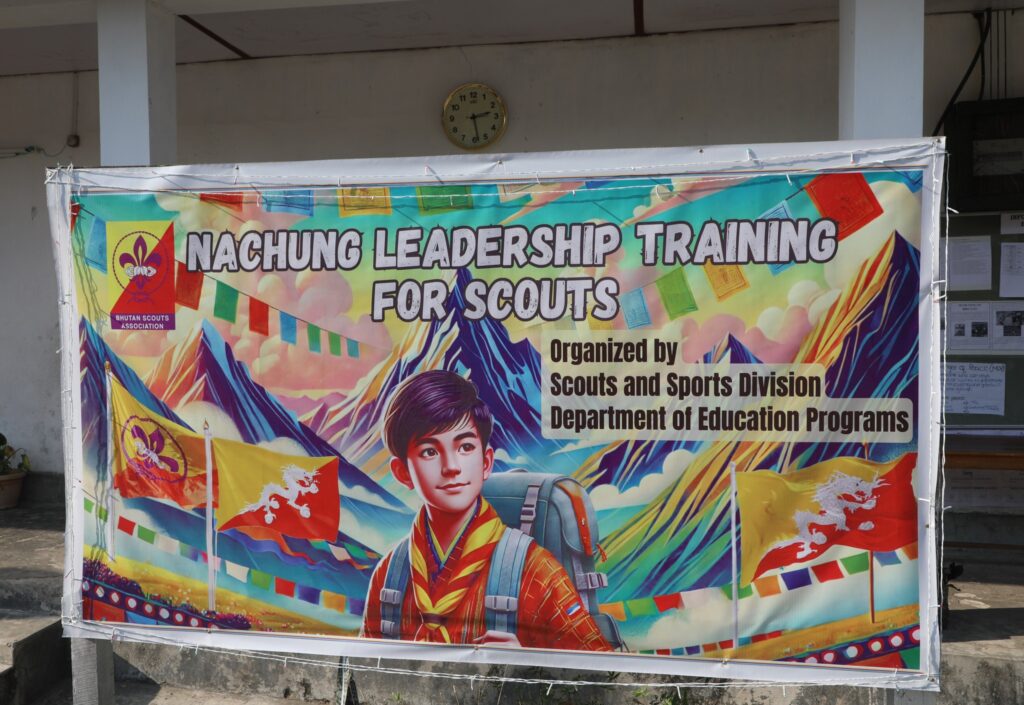
THE FUTURE OF SCOUTING: A SPECIALIZED & COMPULSORY PROGRAM
Starting 2025, Scouting will become a specialized and compulsory program for students in Classes 5, 7, and 9, each focusing on different developmental areas:
- Class 5: Building values, character, and integrity
- Class 7: Developing outdoor practical skills to address real-world challenges
- Class 9: Emphasizing service and community contributions
The new program prioritizes physical fitness, mental resilience, and life skills as a means to ensure a smooth transition to Gyalsung. It prepares youth to be physically healthy and mentally sound, while also addressing key societal issues such as mental health concerns, bullying, and substance abuse.

UPSHIFT Digital Skills Training Package
The UPSHIFT Digital Skills Training Package is a nationally developed learning package designed to strengthen youth innovation and social entrepreneurship in Bhutan through the use of digital technologies. Developed by the Ministry of Education and Skills Development, in partnership with UNICEF Bhutan and the European Union, the package supports the integration of essential digital skills into the UPSHIFT programme across schools, Youth Centers and Community Based Scout groups.
UPSHIFT, implemented nationwide since 2022, empowers young people to identify community challenges and design innovative and sustainable youth-led solutions. As the programme scaled rapidly, the need for a structured digital skills framework became clear. The Digital Skills Training Package responds to this need by embedding practical and appropriate digital competencies into every phase of the UPSHIFT methodology, from understanding problems and designing solutions to building prototypes, pitching ideas, and implementing sustainable projects. More than 143 teachers, Youth Center managers and Community Based Scout volunteers have been trained with the UPSHIFT digital skills training package till date.
The package focuses on 10 core digital skills organised under four key strands: Information and data literacy, communication and collaboration, digital content creation, and online safety and ethics. UPSHIFT participants learn to use widely accessible tools such as Google Workspace, Canva, CapCut, Figma, Tinkercad, and GenAI tools responsibly to research problems, collaborate in teams, create digital content, protect personal data, and present ideas effectively.
Delivered through a train-the-trainers model, the package is integrated into UPSHIFT orientations with flexibility for schools and youth centres to conduct additional hands-on sessions. Monitoring and evaluation mechanisms at both national and school levels ensure quality implementation, continuous improvement, and measurable impact on youth digital literacy and 21st-century skills development. Furthermore, by strengthening digital literacy and practical technology use, UPSHIFT aligns with the Ministry of Education and Skills Development’s Digital Drive, ensuring youth are ready to participate effectively in Bhutan’s evolving digital economy and technology-enabled learning initiatives. UPSHIFT is now integrated in Specialized Scouting program for classes V, VII and IX students with inclusion of UPSHIFT proficiency badge for Scouts exhibiting entrepreneurial and social innovation skills.
The training package includes ready-to-use PowerPoint presentations for each UPSHIFT phase, with clear digital skills and tools mapped to the respective phase activities. These phase-wise PPTs serve as a practical facilitation guide for UPSHIFT focal teachers and Youth Centre Managers to confidently introduce digital tools alongside core UPSHIFT concepts, supporting consistent delivery, reducing preparation time, and ensuring that digital skills are meaningfully integrated in the UPSHIFT program.
The UPSHIFT digital skills training package is available on the Bhutan Scouts Association page.


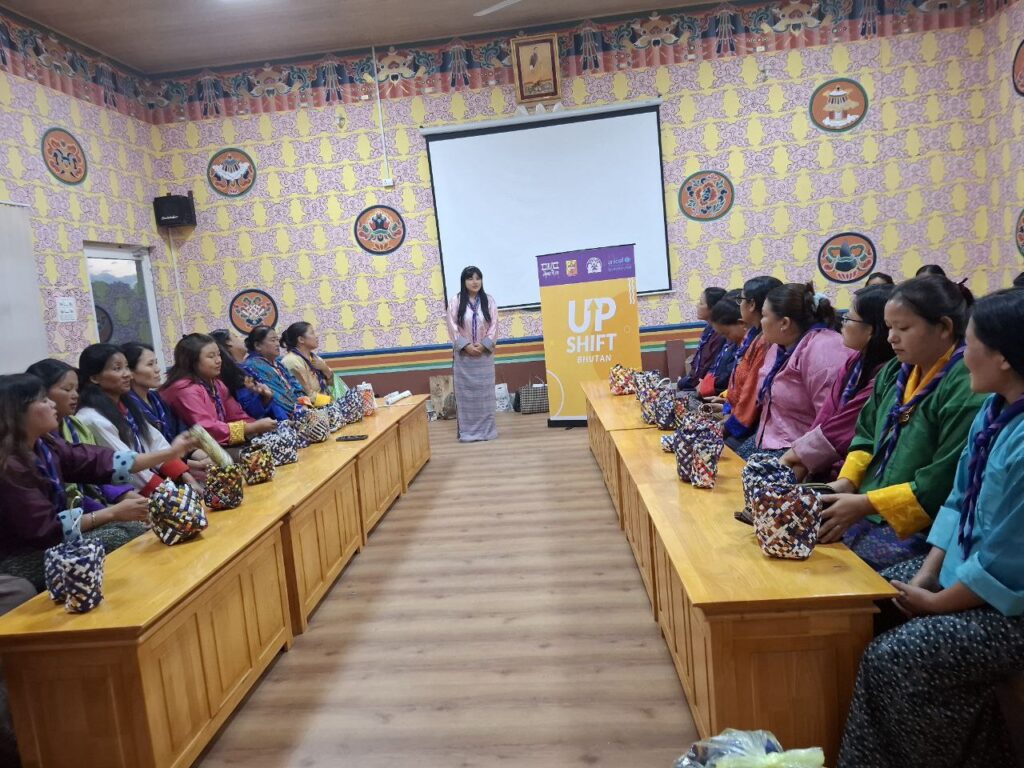
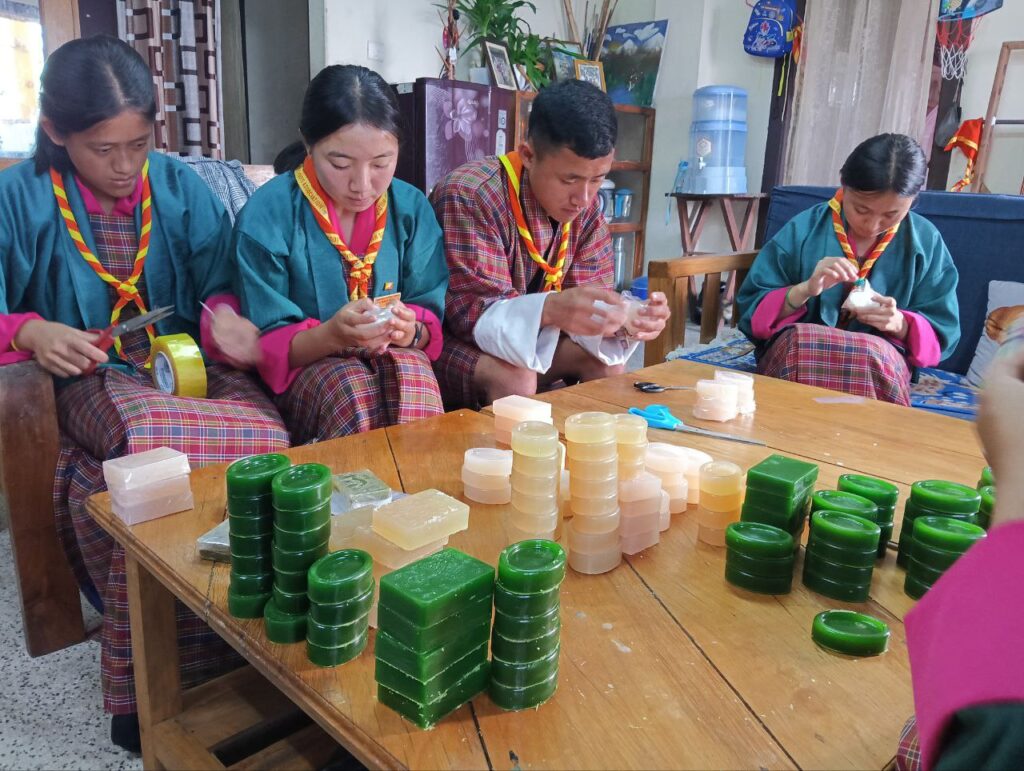
Membership Registration
- Rovers registration: Click Here
- Scout :
- Community Based Scout volunteer: Click Here
Explore
Service Projects
Library
- Handbook
- Guidelines
- Policies
- Brochures
- National Strategic Plan
National Scout Center
Important Links
World Scout Bureau- https://www.scout.org/
Booking form for National Scout Center, Paro –
Contact Us
- +975-02-325177 (Office)
- bhutanscoutsassociation@gmail.com
- bhutanscouts@moe.gov.bt
- bhutanscouts@education.gov.bt
Ministry of Education & Skills Development
- MoESD, Peling Lam, Kawajangsa, Thimphu, Bhutan
- Postal Code: 11001
- P.O. Box: 112
ICT Services
Important Links
- RENEW
- G2C Services
- Ministry of Health
- Ministry of Finance
- Audit Clearance System
- Asset Declaration System
- Zhiyog Electronic System (ZESt)
- Security Clearance System
- Department of Revenue & Customs
- Government Inventory Management System
- Ministry of Agriculture and Livestock
- Ministry of Industry, Commerce and Employment
